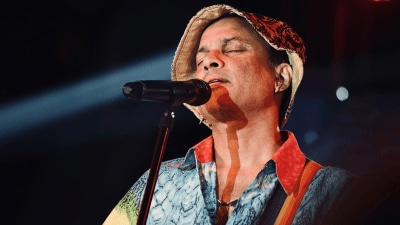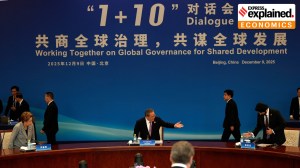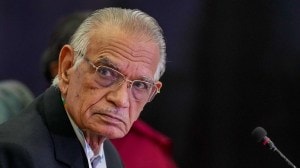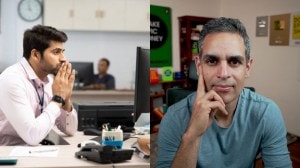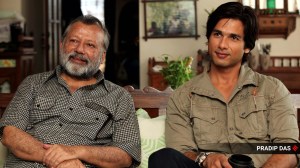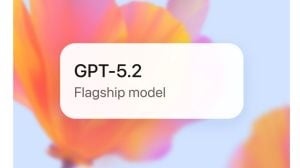Everybody now wants to be a patriot and assert identity, not just in politics but in cinema too: Saeed Mirza at Idea Exchange
Saeed Mirza on his memoir of Kundan Shah, director of the iconic Jaane Bhi Do Yaaro, blending the personal with the political and why he worries for young filmmakers. This session was moderated by Shubhra Gupta, Film Critic, The Indian Express
 "I think we are on the road to identity, patriotism and majoritarianism," filmmaker Saeed Mirza said at Idea Exchange. (Express photo by Praveen Khanna)
"I think we are on the road to identity, patriotism and majoritarianism," filmmaker Saeed Mirza said at Idea Exchange. (Express photo by Praveen Khanna) Shubhra Gupta: Your new book, I Know the Psychology of Rats (Tulika Books), is a short history of India while it is also about your life with Kundan Shah. Can you talk a bit about Shah?
He came from a trader family and thought cinema had nothing to do with politics.
There were debates in FTII (Film and Television Institute of India) about cinema, poetry, music, literature, history and politics simultaneously and Shah tried very hard to avoid them. He did keep himself relatively free from politics but his last diploma film was an absolute gem. It shocked us all.
Shubhra Gupta: Shah made the 1983 Jaane Bhi Do Yaaro, which I think is India’s most polemical and political work. How did that huge leap happen and how much of it has to do with you?
The story is linked with FTII. Of course, it all comes back a full circle, but it also links with the fact that he went to England to seek a future. He was married, he worked as a clerk in a company. That stint in England made him realise things like race, colour, skin and history of colonialism. In England, in three years, he also finished reading a few books. He loved books. He picked up a lot of Leftist and socialist literature. After he returned, he made Jaane Bhi Do Yaaro. His journey has been far more tumultuous than ours as we were already there, in a certain sense. To me, his journey has been so critical. That’s why the book. From an incredibly tunnelled vision, suddenly he opens up and it’s inclusive and vast.
Shubhra Gupta: As the assistant director in your first film, he kept a very close eye on the accounts. What else did he help you do?
We should all get degrees in management. When you have very little money , how do you make a film? You have to make each rupee become four rupees to get somewhere. And it teaches you stuff that you have to do. For instance, how much raw stock can you use? Imagine making a film at that time when the budgets were Rs 2 crore or more. But you’re making a film with Rs 3.5 lakh. How do you do it? It teaches you something. It teaches you to have a fire in your belly. To hell with rules and regulations about where you can or cannot shoot on the streets. Use all your old friends and acquaintances for all the homes, cars or whatever you might need. That’s how you make a film. That’s something that Shah was acutely conscious of. Make every rupee become at least four.
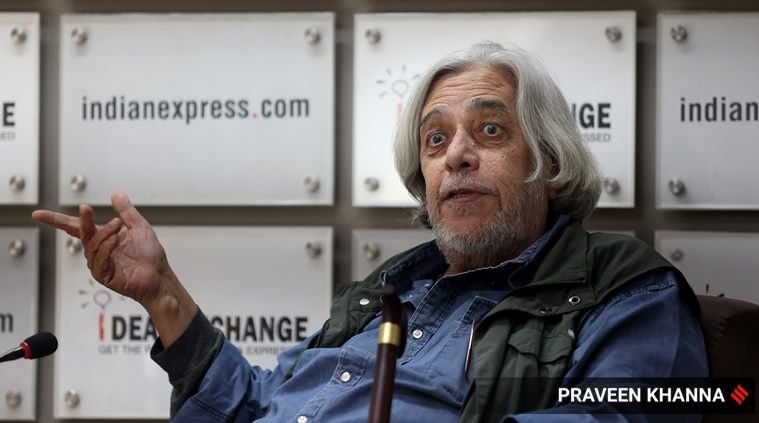 “All filmmakers have a worldview. What is the worldview that you’re bringing? That is important,” said Saeed Mirza. (Express photo by Praveen Khanna)
“All filmmakers have a worldview. What is the worldview that you’re bringing? That is important,” said Saeed Mirza. (Express photo by Praveen Khanna)
Shubhra Gupta: In your book, you talk about Jaane Bhi Do Yaaro and your father’s connection with it. How did that happen?
My father was a well-known scriptwriter and he was on the team of the National Film Development Corporation of India (NFDC). When people wanted loans, the script would be vetted by this group of writers. Shah’s script went to my father. He didn’t know who he was. My father wanted to see this filmmaker who’s making this film. Shah goes in with a lot of trepidation. The script was sent to the scriptwriters because some panel had decided that it required some changes. He meets my father who sees the script and says that the script is snow and if Shah made any changes, it’ll become ice. My father said, don’t make any changes, just shoot the film.
Shubhra Gupta: You made movies that made a strong comment on how society was around us. It was something that you could take for granted. But what else do you remember that is so special about Jaane Bhi Do Yaaro?
Shah worked with me in Albert Pinto Ko Gussa Kyoon Aata Hai. The time was late ’70s, early ’80s. We were a democratic country and were allowed to do stuff, by and large. There were some problems sometimes with the censor board, of course, but never anything major. We were allowed to function. Now, once in a while, you did get to see a documentary going through immense trouble like the ones made by Anand Patwardhan. But they were manageable. Not to say that everything was incredibly democratic, under, say, a Congress regime. They had their restrictions, codes of conduct and a censor board. And we, by and large, adhered to them. But it was much freer. You could say what you wanted to say with relative caution. Today, it’s not possible at all. It’s just so tough. And I worry for young filmmakers.
Shubhra Gupta: When you said that Shah became more of a Marxian than even Karl Marx, what did you mean by that?
For me, to be Left is to be poetic. The idea is that the Left is a compassionate, inclusive vision of the world beyond race, gender, religion, caste, creed and language. I think these are fundamental positions of the Left. If that is not poetic, what is? It’s got nothing to do with a strike or salutation. It is not strident. It is poetic. It is to understand yourself and where you’re coming from.
Shubhra Gupta: Shah went on to make other films but none of them had the same power as his first film. You saw his trajectory. Did his thinking change?
Once you entered, what he would call, the realm of commerce — commercial cinema, suddenly, the subject material made a shift. The inputs, in terms of the script, were coming in from all kinds of sources, as opposed to coming from Shah himself. When you accept these interjections that come into your work, something’s going to happen in the final product. He said that’s commercial cinema. That’s the way it operates.
Shubhra Gupta: What were these things where he started to see the world differently?
He had a strange fascination with this Stanley Kubrick film called Dr Strangelove. If you want to discuss imperialism and war, Dr Strangelove is an idea. He said that is what capitalism really is all about. It is the grotesque version that you bring in.
Shubhra Gupta: Jaane Bhi Do Yaaro was very much a film of its time, but I don’t know whether he managed to actually create a trajectory about looking at the world around him in his subsequent films.
People thought Jaane Bhi Do Yaaro was a comedy. This distressed him to no end. They wanted him to be funny. And he said I’m not going to be caught in this trap of trying to be funny. That was his journey, his battle. Because he was stuck with a film that people thought was just funny, as opposed to being much more than this. It was a very angry film.
Shubhra Gupta: You wrote this book in Kashmir last year on a houseboat and your reflections about the world around you.
It is about a conversation with Shah and his worldview and mine. It’s a combination of trying to understand our world through this journey of ours — films, politics, history, literature and poetry. Hopefully, the reader will be able to see what we’ve inherited. Where we’re at right now. That’s the idea behind the book: where we are right now. Not just in India, but around the world.
Devyani Onial: The Kashmir Files, a film made on the exodus of the Kashmiri Pandits, was recently called ‘vulgar’ and ‘propaganda’ by the chairman of the International Film Festival of India (IFFI) jury? Do you agree with that description?
For me, The Kashmir Files is garbage. Is the Kashmiri Pandit issue garbage? No, it’s not. It’s real. Is it just Kashmiri Hindus? No. Muslims, too, are caught in an incredibly vulgar trap of the machinations of intelligence agencies, nations with so-called national interests, and paid guys from across the border, who continue to create havoc. The point is not to take sides. Be human and try to understand.
Shubhra Gupta: Kundan Shah once apologised to you about the…
He apologised to me about the Gujarat riots. He said, I’m a Hindu so somebody needs to be accountable. I know nobody will be. I said within the 21st century you are becoming a Hindu and me, a Muslim? He said that’s what it is. You’re denying it, this is the truth of my country.
Rinku Ghosh: Why do you think young filmmakers at the FTII are not trying to interpret this scenario through filmmaking anymore?
They’ll be sent to jail. Sedition. You try speaking your mind as a filmmaker… It’s time to stand up and say enough. Have you heard about the McCarthy revelations in America? One old person at that hearing turned to McCarthy and said, “Aren’t you ashamed of yourself?” The hearing stopped. That’s it. We have come a long way beyond that.
Shubhra Gupta: You used the line “teaching them a lesson” in your book…
These are perceptions of history. The past is being weaponised. And beautifully done and completely distorted. But that doesn’t matter any longer. When a man is lynched for having beef in his refrigerator, there’s a moment of resonance with some people in the country but the police first go and check whether the meat was beef or not. Not whether the man was lynched. So what if it was beef? This is the truth. Bulldozers are going to be your weapons of justice.
Aakash Joshi: What kind of art will be produced by the kinds of stories, films and literature that children will be hearing today? There’s a new kind of story that’s going around.
Oh, yes, of course, a new narrative that is being whispered in gullies, mohallas and qasbas. The art of the rumour and in the dark is very frightening. Despite our Constitution, it’s happening. I wrote Naseem as an epitaph of the Constitution and the end of poetry because I sometimes believe that the Constitution was a leap of faith. It was an aspiration as opposed to reality. It was an idea of what we want to be as a people, and we proclaimed it to ourselves and to the world. But were we like that?
Aakash Joshi: Uri: The Surgical Strike is a technically brilliant film. But one could read propaganda into it quite easily. There is big-budget filmmaking going on. It’s cliche storytelling, not challenging storytelling. There is a lot of craft that goes into it. How do you see that?
It is populism and it’s also searching for identities in a sense. It doesn’t have the crassness of The Kashmir Files but you make a lot of money through patriotism. Every country does it. We are trying to find an identity for ourselves and I think this is a journey. It’s a new journey and I’m not sure where it will lead. It’s very assertive and very macho. It’s very majoritarian. But in that, what are you losing? I think we are losing poetry. I think that’s the issue. I think a nation should have an identity. I am all for the various languages, cultures, dress codes and everything else. This is what we’re all about. When you’re trying to remove that and to come to one identity, you are very close to being a fascist. We are lost as a nation, thanks to a lot of things that have happened in the past.
Shiny Varghese: You’ve spoken about how there’s only cinema with integrity and cinema without integrity. What did you mean?
All filmmakers have a worldview. What is the worldview that you’re bringing? That is important. What is the motive? One, of course, is profit. But the other is an identity which denies other identities, (if so) then you’re on the verge of being fascist, of being exclusive. You are in denial of some kind of history and I would object to that.
Shubhra Gupta: Even the mainstream, the so-called commercial cinema, of your time was looking at India as a whole. In your book, you talk about Bombay being a city of dreams and of dissenters and that is something that gets into the arts and films. Where do you think we are right now?
I think we are on the road to identity, patriotism and majoritarianism. Fundamentally, we want to be patriots and we want to assert our identity. Through that, is a journey of cinema simultaneously. Not just in politics. It’s also in the realm of art. You can see it being manifested. It works and pays.
Shalini Langer: Currently, are there any Indian filmmakers who you think are making political films?
There are many young filmmakers who are. There is Anik Dutta, Gurvinder Singh, Chaitanya Tamhane, Manso Re. Natesh Hegde. Aamir Bashir made a film on Kashmir. Will they be able to go further and reach out to more people? I don’t know. Who controls platforms (OTT)? A battle also lies there.
Shalini Langer: How much of the iconic Mahabharata scene of Jaane Bhi Do Yaaro was written and how much was it improvised? How did it come about?
It was pure chaos. If the idea is there and you have approximately 60 per cent worked out in your head, and 40 per cent improvised, then you should let the actors do it. We shot so much, we had a lot of footage! In fact, Anupam Kher also acted in the film. He had played the role of a marksman. But we had to edit that footage out of the movie. I borrowed some of the madness for Mohan Joshi Hazir Ho!
Shubhra Gupta: The last scene in the film, which is even more iconic, is in which they put that noose around their neck. So you think that Kundan Shah would have made it any different if he had made that film today?
He would have made it much darker.
Shubhra Gupta: In your book, you’ve used the words sadak chaap, obscene, tamasha and grotesque. All of these words are very difficult to actually associate with the filmmaker who made Jaane Bhi Do Yaaro.
It doesn’t have a class consciousness to it. It has got to do with an idea. I’ve written an essay — The Lumpenisation of Aesthetics, in which the middle class and upper middle-class are completely lumpenised. We don’t even know that we have become lumpens. We don’t care if Umar Khalid or Gautam Navlakha are in jail. We live on.
Shubhra Gupta: So basically don’t put nooses around our necks and give up.
Fight privately. Not out loud. But the battle is on.
Suanshu Khurana: Was the cinema that was made in your time made like that because of a certain kind of tehzeeb, the way people wrote and spoke? For example, how a Kaifi Azmi or a Shrilal Shukla would write. Did what was written and read at that time influence the cinema that was being made?
Perhaps. Social or political circumstances of those times, as opposed to now, perhaps (influenced the cinema of that time). But Kundan Shah would say get down to the roots. Get onto the road, get into the gutters, because that’s where the world is headed.
- 01
- 02
- 03
- 04
- 05


